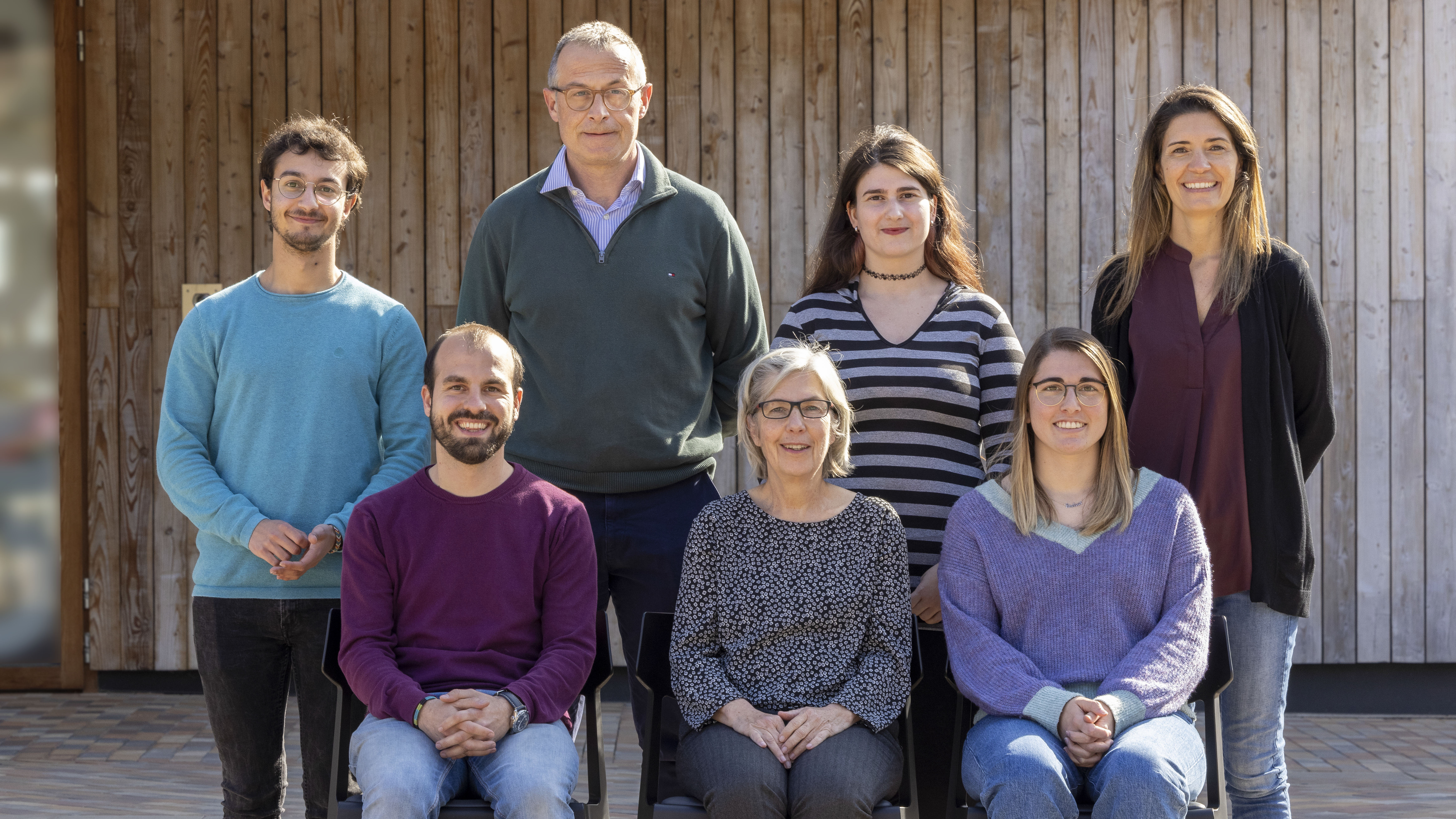About
Synucleinopathies are characterised by abnormal alpha-synuclein oligomerization and aggregation. Parkinson's disease (PD) and dementia with Lewy bodies (DLB) are Lewy body diseases where aggregated alpha-synuclein deposits as Lewy bodies. Whereas PD is the most common movement disorder, DLB is the second most common cause of dementia after Alzheimer's disease (AD). DLB also shows an important neuropathological overlap with AD difficulting its clinical diagnosis. Additionally, PD, DLB and AD are characterised by a high grade of heterogeneity, so that PD and DLB are only umbrella terms for groups of diseases showing similar pathological and clinical features. However, they develop as a result of different primary molecular changes during the very first stages of the disease.
The research group’s main goal is to identify these different mechanisms to define different disease subgroups and, with the aim of disentangling this heterogeneity, its main objectives are:
- Molecular characterisation of dementia with Lewy bodies with special focus on genetic variants, differential expression of alternative transcript variants and miRNAs.
- Identification of diagnostic biomarkers for dementia with Lewy bodies in different peripheral sources including blood, plasma, platelets and saliva.
- Establishment of cell and possibly also animal models suitable for testing of results.
- Development of diagnostic panels for the clinical diagnosis of dementias and Parkinson's disease.
The team’s research has a strong translational character, and so, their final aim is to translate research results from post-mortem brain tissue to peripheral tissues. So far, they have identified four biomarkers and have patented all of them. Two are specific for DLB subgroups, whereas the other two may serve as an early diagnostic marker of DLB.
Since neuropathological changes start up to 20 years before clinical symptoms of either PD or DLB become evident, they are currently extending their research to prodromic phases of Lewy body disorders.
Keywords: Lewy body diseases, dementia with Lewy bodies, Parkinson's disease, Alzheimer's disease, alpha-synuclein, alternative transcripts, platelets, blood biomarkers, saliva biomarkers.

Group leader
- Katrin Beyer
Katrin Beyer
Since 1994, Katrin Beyer has been working in the field of neurodegenerative dementias and, in 2003, she defended her doctoral thesis titled "Genetic characterization of Alzheimer's disease", which showed that the impact that different risk factors have on Alzheimer's disease (AD) depends on the age of disease onset.
Soon after, she began to study molecular aspects of synucleinopathies and has focused especially on dementia with Lewy bodies (DLB), which is characterised by a significant overlap with AD and up to 80% of cases are misdiagnosed as AD. Misdiagnosis results in incorrect treatment of patients with DLB, 50% of whom may show an adverse reaction to the treatment. Thus, it has become a major goal to provide neurologists with a reliable diagnostic tool to improve DLB diagnosis. Due to low diagnostic specificity, so far it has not been possible to develop DLB specific therapies, and even most of AD clinical trials are failing because of heterogeneity of patients included in these trials, since up to 30% of patients with AD diagnosis are actually DLB patients. Accordingly, the development of accurate diagnostic tests will also improve the outcome of clinical trials for AD and DLB and will speed up the development of specific therapies. The latter will significantly improve the quality of life of patients and their families and caregivers.
For fourteen years, Beyer has led the small and very dynamic Genomics and Transcriptomics of Synucleinopathies Research Group, which hosts a post-doctoral fellow, currently two pre-doctoral students, a laboratory technician and 1-2 Master's students yearly. The team is working on the genetic characterisation of Lewy body diseases and their subgroups on one hand, and the identification and characterisation of diagnositic biomarkers, on the other. Some of their results have been patented as biomarkers for DLB, two for the identification of specific DLB subgroups (EP2539461B1, EP11006277), one to monitor the treatment with anti-alpha-synuclein aggregation therapies (EP15382241.6) and one for patient stratification (EP18382540.5). The two latter are further developed to provide valuable tools for clinical practice.
Contact: kbeyer(ELIMINAR)@igtp.cat
ORCID: 0000-0001-8905-1514
Team
Medical neurologists
Pau Pastor Muñoz(ELIMINAR)
Dolores Vilas Rolan(ELIMINAR)
Daniela Samaniego Toro(ELIMINAR)
Post-doctoral fellow
Jorge Mena Lucía(ELIMINAR)
PhD students
David Adamuz Comino(ELIMINAR)
Laura Arnaldo Orts(ELIMINAR)
Master's students
Ivan Changuan Oña(ELIMINAR)
Arnau Comellas Martínez(ELIMINAR)
Research lines
- Molecular characterisation of dementia with Lewy bodies. Identification of subtypes
- Biomarker research. Identififcation and characterisation of peripheral biomarkers
- Establishment of cell and animal models suitable for testing of results
Active projects
Validación de biomarcadores líquidos y de imagen para el diagnóstico de la demencia con cuerpos de Lewy prodrómica
PI: Dr Pau Pastor; Co-PI: Katrin Beyer
Funding agency: Ministerio de Ciencia e Innovación
Agency code: PMP22/00100
Duration: 2023 – 2026
The role of platelets as biomarker reservoirs for dementia with Lewy bodies
PI: Katrin Beyer
Funding agency: Ministerio de Salud
Agency code: PI21/00833
Duration: 2022 - 2025
Blood miRNAs as diagnostic tool for dementia with Lewy bodies
PI: Katrin Beyer
Funding agency: Fondo Europeo de Desarrollo Regional (FEDER) - Agència de Gestió d'Ajuts Universitaris i de Recerca (AGAUR)
Agency code: 2021 PROD 00049
Duration: 2022 - 2024
Neuroimagen y marcadores periféricos de demencia con cuerpos de Lewy prodrómica (IMAPERDEMLEWY)
PI: Pau Pastor
Funding agency: Ministerio de Salud
Duration: 2022 - 2025
Scientific publications
Highlighted publications
Beyer K, Domingo-Sàbat M, Santos C, Tolosa E, Ferrer I, Ariza A. The decrease of β-synuclein in cortical brain areas defines a molecular subgroup of dementia with Lewy bodies. Brain. 2010 Dec;133(Pt 12):3724-33. DOI: 10.1093/brain/awq275.
Urbizu A, Canet-Pons J, Munoz-Marmol AM, Aldecoa I, Lopez MT, Compta Y, Alvarez R, Ispierto L, Tolosa E, Ariza A, Beyer K. Cystatin C is differentially involved in multiple system atrophy phenotypes. Neuropathol Appl Neurobiol. 2015 Jun;41(4):507-19. DOI: 10.1111/nan.12134.
Gámez-Valero A, Prada-Dacasa P, Santos C, Adame-Castillo C, Campdelacreu J, Reñé R, Gascón-Bayarri J, Ispierto L, Álvarez R, Ariza A, Beyer K. GBA Mutations Are Associated With Earlier Onset and Male Sex in Dementia With Lewy Bodies. Mov Disord. 2016 Jul;31(7):1066-70. DOI: 10.1002/mds.26593.
Perez-Roca L, Adame-Castillo C, Campdelacreu J, Ispierto L, Vilas D, Rene R, Alvarez R, Gascon-Bayarri J, Serrano-Munoz MA, Ariza A, Beyer K. Glucocerebrosidase mRNA is Diminished in Brain of Lewy Body Diseases and Changes with Disease Progression in Blood. Aging Dis. 2018 Apr 1;9(2):208-219. DOI: 10.14336/AD.2017.0505.
Gámez-Valero A, Campdelacreu J, Vilas D, Ispierto L, Reñé R, Álvarez R, Armengol MP, Borràs FE, Beyer K. Exploratory study on microRNA profiles from plasma-derived extracellular vesicles in Alzheimer's disease and dementia with Lewy bodies. Transl Neurodegener. 2019 Oct 3;8:31. DOI: 10.1186/s40035-019-0169-5.
Additional information
Collaborative networks
European DLB (e-DLB) consortium
The e-DLB consortium was created to facilitate and homogenise the identification of diagnostic and prognostic biomarkers in dementia with Lewy bodies. Its members come from 44 centers in 20 European countries and 10 centers in 7 countries outside Europe.
Mission: To conduct translational clinical research and clinic trials targeted at addressing the global critical public-health need of combating Dementia with Lewy Bodies (DLB) and with the aim of ultimately improving quality of life and other outcomes for people with, or at high risk of developing, DLB and their carers.
Vision: Their vision is to further develop the consortium/registry, provide a setting in which to increase the basic scientific understanding of and to develop ways to diagnose, prevent, slow or ameliorate the core symptoms of DLB and common comorbidities of DLB.
Currently, the group is actively collaborating with Dr Nedelska from Prague and Dr Aarsland from Stavanger (Norway). They have obtained samples from both sites.

Global Parkinson's Genetics Program (GP2)
The Global Parkinson's Genetics Program (GP2) is a resource program of the Aligning Science Across Parkinson's (ASAP) initiative focused on improving our understanding of the genetic architecture of Parkinson's disease (PD) and making this knowledge globally relevant.
GP2 is made up of member organizations around the world that are coming together to create a global research community dedicated to rapidly addressing emerging research needs in PD. The work of GP2 is aimed at using genetics knowledge to accelerate the path to the development and deployment of therapeutic strategies for PD.
The group has contributed to GP2 by sending more than 350 DNA samples collected from PD patients. The data and results are openly shared and are available for individual processing. The next stage of sample preparation is ongoing, and samples will be shipped shortly.

Others
Katrin Beyer received Expertscape's Recognition as an Expert in Lewy bodies (placement by PubMed-based algorithms in the top 1% of scholars writing about Lewy Bodies over the past 10 years) in September 2021.
News
Nuevos marcadores candidatos para la demencia con cuerpos de Lewy y la de Parkinson en las transcripciones de la proteína SNCA en sangre
El grupo de investigación de Genómica y Transcriptómica de las Sinucleinopatías, liderado por la Dra. Katrin Beyer, ha publicado un nuevo estudio en el Journal of Molecular Science que da un paso más en la búsqueda de un biomarcador fiable para poder diferenciar entre la demencia con cuerpos de Lewy y la enfermedad de Parkinson en los estadios iniciales, cuando los síntomas son muy similares. El diagnóstico correcto es todavía un reto difícil en estos casos, pero es clave para los pacientes ya que un tratamiento equivocado puede tener efectos muy graves.
Tres proyectos de innovación del IGTP reciben una beca CaixaImpulse
Tres grupos de investigación del IGTP han recibido 3 de las 21 becas de la convocatoria 2019 de CaixaImpulse, otorgadas por la Fundación Bancaria 'la Caixa'. Los proyectos becados liderados por la Dra. Katrin Beyer, el Dr. Francesc Borras y la Dra. Alicia Martínez Piñeiro se dedican a mejorar el diagnóstico de la demencia con cuerpos de Lewy, nuevos métodos para el seguimiento de la disfunción renal y la investigación de nuevos marcadores predictivos en el ictus isquémico agudo, respectivamente.
Contact
(+34) 93 554 30 50 extn 6560
More links
Katrin Beyer at HUGTiP's webpage · Follow @KatrinBeyer2 on X · Donate via Amics de Can Ruti

